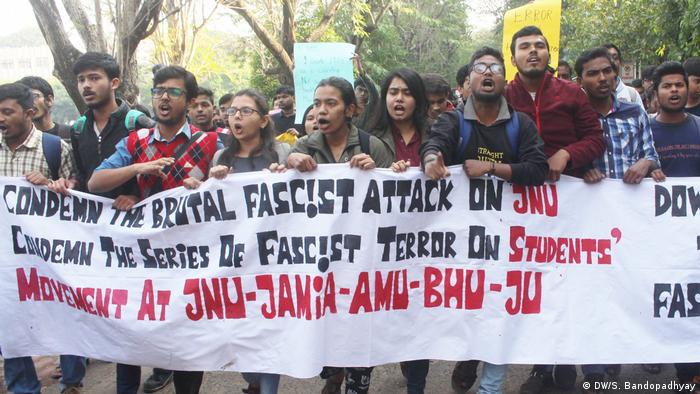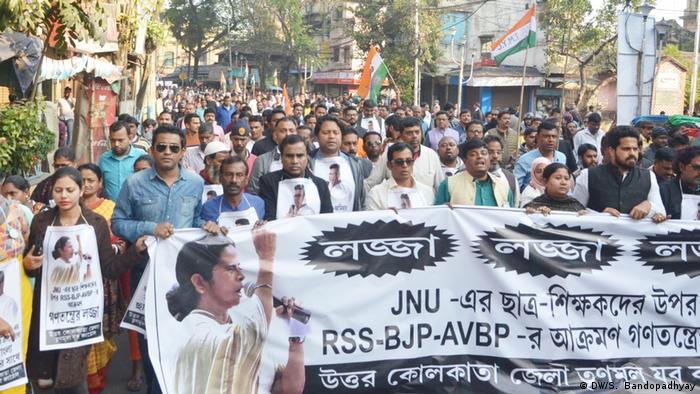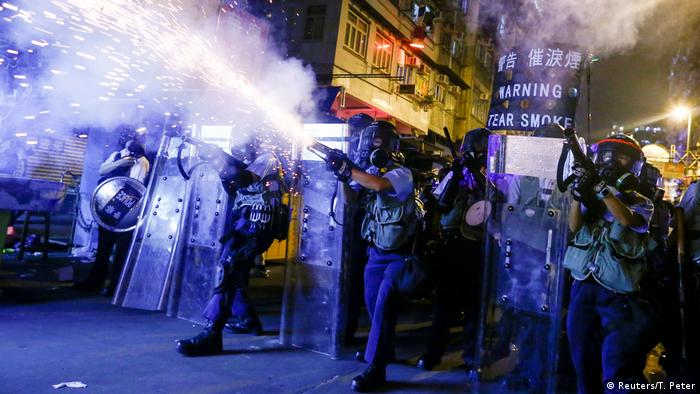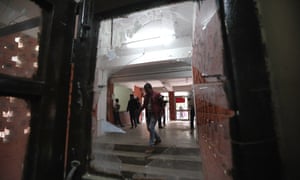Students protest across India after attack at top Delhi university
Opposition links violence to Narendra Modi’s BJP party and tensions over citizenship law
Students have protested in cities across India after a masked mob stormed a high-profile university in Delhi and attacked students and teachers with weapons including sledgehammers, iron rods and bricks, injuring more than 30.
Opposition parties and injured students blamed Sunday night’s violence on a student organisation linked to the prime minister Narendra Modi’s Hindu nationalist Bharatiya Janata party (BJP), which has increasingly targeted the institution.
The attack at the Jawaharlal Nehru University (JNU), long seen as a bastion of leftwing politics, comes as students lead a nationwide campaign against a citizenship law introduced last month by Modi that is seen as targeting Muslims.
Videos that emerged after the assault showed people in masks roaming inside the corridors of the university and beating students who were protesting against a fee rise.
Students at the Sabarmati hostel, which bore the brunt of the violence, described on Monday how they had locked themselves into their rooms when they heard glass being smashed or ran outside and hid in bushes until the attackers dispersed.
“Even after it was over, I had the most fearful night of my life, lying awake listening to every footstep in the corridor,” said Arjit Sharma, 23, a student of ancient history at JNU. One attacker told him: “We’ll come back for you.”
The violent clashes have further polarised an already poisonous atmosphere that’s prevailed for three weeks over the citizenship law. Although the JNU clashes were not about the law, which has triggered massive nationwide protests, they have added to the growing sense of unrest.
Scores of students left JNU on Monday, ignoring a plea by the university’s proctor to stay. One of those preparing to leave, Gayatri Basumatary, 23, said: “My parents are frantic. What happened is beyond any limit. They want me to get away from this madness.”
Those students who have remained are being extra vigilant. Satarupa Lahiri, who was in the hostel washroom when she heard screams and window panes being smashed, said: “It feels like a battle zone. We are walking around only in groups of 10 or 12 for safety.
“I am staying. Some students live a long way away and can’t afford the fare home so we have to show solidarity by staying on. We have to stick together. After all, it’s our campus. We can’t let these thugs take it away from us,” she said.
Opposition parties have accused the BJP of tacitly encouraging rightwing gangs to enter campuses and attack students. The main opposition Congress party called the attack on JNU “state-sponsored terrorism”. The BJP in turn has accused the opposition of encouraging anarchy and rioting.
“The fascists in control of our nation are afraid of the voices of our brave students. Today’s violence in JNU is a reflection of that fear,” tweeted Rahul Gandhi, a leading Congress politician.
The Akhil Bharatiya Vidyarthi Parishad, the student wing of the BJP, denied accusations that it was behind the attack, which it blamed instead on rival leftist unions.
Authorities faced criticism for failing to rein in the violence on a campus viewed as a centre of resistance to Modi’s policies, including the abolition last year of special status for Muslim-majority Kashmir.
Amit Thorat, who teaches economics at JNU, said he called the police a little after 7pm on Sunday but they didn’t come until an hour later. Nearly a dozen students Reuters spoke to said police watched as the mob rampaged inside the campus.
Surya Prakash, 25, a research scholar at the university’s Sanskrit school, said he had been brutally beaten in his dorm room despite telling them he was blind. They broke the door and windows of the room, barged inside and hit his head with a rod, said Prakash.
One floor up from Prakash, above the dorm wardens’ residence, students said two Kashmiri Muslim students living in adjacent rooms were targeted. While the attackers used a fire extinguisher to ram open a door, one student climbed over his balcony into the next-door room while another jumped on to the ground below, sustaining an injury, according to Mukesh Kumar, a research scholar who lives across the hall.
An ambulance carrying injured people off campus was attacked by a group of men with sticks while police stood by, bystanders said.
Critics accuse Modi of pushing a Hindu-first agenda that undermines India’s foundations as a secular democracy. The citizenship law lays out a path for Indian nationality for minorities from six religious groups in neighbouring countries but excludes Muslims.
The government condemned the violence. “Horrifying images from JNU the place I know and remember was one for fierce debates and opinions but never violence. I unequivocally condemn the events of today,” said the finance minister, Nirmala Sitharaman, a member of the prime minister’s party, on Twitter.
Associated Press and Reuters contributed to this report
Monday's protests follow a violent attack by masked assailants on students at a university in New Delhi. Some have blamed the clashes on a student group linked to Prime Minister Narendra Modi's Bharatiya Janata Party.

Fresh student protests are taking place across India following violent clashes at a prestigious university in New Delhi which left more than 30 people injured.
Late Sunday, masked assailants beat students and teachers with rods and bricks at the capital's Jawaharlal Nehru University (JNU) in an assault that opposition lawmakers say is linked to the government.
Police in India criticized for brutal response to protests
Videos of the attack showed people in masks assaulting students who were protesting against a fee hike. Assailants also vandalized dormitories and university halls. Scores of riot police on Monday patrolled JNU. Police have begun a probe and say that they have found some of the assailants, but so far, no arrests have been made.
Students at universities across the country continued to protest Sunday's assault on demonstrators. Nimisha Jaiswal was at the JNU for DW, describing a heavy police presence and tense atmosphere, but also a calm day.
Students also challenged police for failing to step in on Sunday, with police saying they were waiting on authorization to act and to organize a large enough force to manage the crowd. Students countered that the police response had been far swifter during protests last month at the university.
Read more: Indian state shuts down internet ahead of protests

Jadavpur University students protest aginst the JNU attacks, on Monday in Kolkata.
In response to the attacks, more than 1,000 people held a vigil in Mumbai, and demonstrations took place in major cities across India, including Bangalore, Kolkata and Hyderabad.
Read more: India citizenship bill ignites mass protest over migration fears
Uncertainty over the assault
New Delhi Police Commissioner Amulya Patnaik told the Associated Press that Sunday's incident was a clash between rival student groups. However, opposition parties have pinned the blame on Akhil Bharatiya Vidyarthi Parishad, a right-wing Hindu nationalist student organization connected with Prime Minister Narendra Modi's Bharatiya Janata Party (BJP).
Sitaram Yechury, general secretary of the Communist Party of India, said the attack was a "collusion" between the JNU administration and "goons" of the Modi-linked party.
German told to leave India over protests
Modi's BJP, however, denounced the attacks in a tweet. "This is a desperate attempt by forces of anarchy, who are determined to use students as cannon fodder, [to] create unrest to shore up their shrinking political footprint. Universities should remain places of learning and education," the party said.
Many students and organizers at JNU have protested Modi's policies in recent years. Protests against the fee hike, which students said would make education too expensive, kicked off in November.

2019: A YEAR OF PROTESTS, EVERYWHERE!
Hong Kong's stability jolted
Protests erupted across Hong Kong in June over the introduction of a bill to allow the extradition of fugitives to mainland China. The bill was withdrawn in September, but months later, protesters are still demanding full democracy for the territory and an inquiry into police violence. The rallies have regularly turned ugly and security forces have been accused of being too heavy-handed.
Indian state shuts down internet ahead of protests
Authorities in India's most-populous state have been bracing for protests after Friday prayers. At least 16 people have been killed in the state, most of them shot dead. (27.12.2019)
India citizenship bill ignites mass protest over migration fears
In northeast India, protests have broken out over a bill that would grant citizenship to migrants from religious minority groups. Opponents say that the bill would endanger the region's "cultural identity." (10.01.2019)
Protesters killed as India's Modi meets lawmakers over citizenship bill
India's Prime Minister called a meeting with ministers to assess the ongoing protests over a controversial citizenship bill. So far at least 23 people have died, with the violent protests showing no sign of stopping. (21.12.2019)
German student asked to leave India after joining student protests
A German student will leave India after receiving "oral directions" from immigration authorities. He had participated in protests against legislation to expand citizenship for non-Muslim immigrants in India. (24.12.2019)
India's Modi says new citizenship law is not against Muslims
Scores of people have been killed as a result of violent protests against a citizenship amendment law, which critics say discriminates against Muslims. Indian PM Narendra Modi says the opposition is distorting the facts. (22.12.2019)
2019: A year of protests, everywhere!
Millions have mobilized globally this year over a lack of democracy, ethnic discrimination, corruption and climate change. From China to Chile, Sudan to Sweden, people have hit the streets demanding change. (23.12.2019)

No comments:
Post a Comment